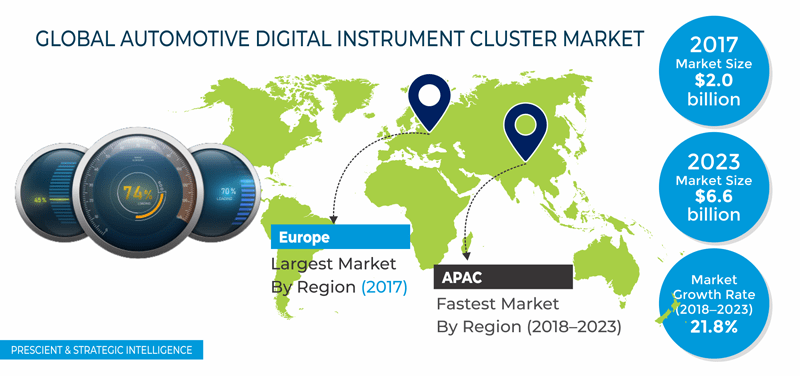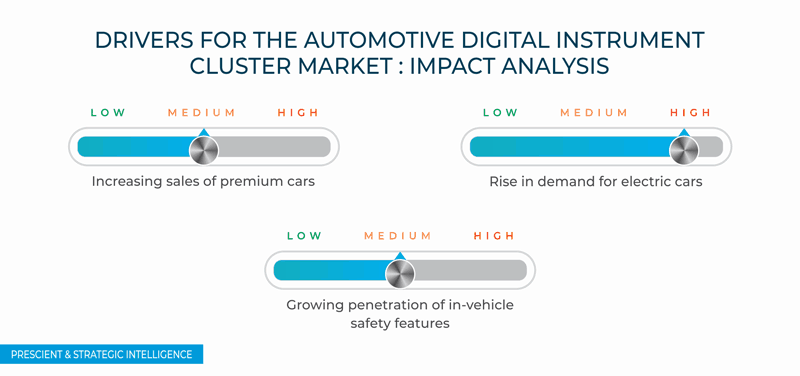Report Code: 11390 | Available Format: PDF | Pages: 183
Automotive Digital Instrument Cluster Market by Display Type (TFT-LCD, LCD, OLED), by Display Size (5-8 inch, 9-11 inch, >12 inch), by Car (Conventional, Electric [HEV, BEV, PHEV]), by Car Price (Premium, Medium), by Technology (AI, Non-AI), by Geography (U.S., Canada, China, Japan, South Korea, India, Germany, U.K., Italy, France, Russia, Brazil) - Global Market Size, Share, Development, Growth, and Demand Forecast, 2013-2023
- Report Code: 11390
- Available Format: PDF
- Pages: 183
- Report Description
- Table of Contents
- Market Segmentation
- Request Free Sample
The global automotive digital instrument cluster market was valued at $2.0 billion in 2017, which is expected to reach $6.6 billion in 2023, growing at a CAGR of 21.8% during 2018–2023.
Among all regions, Europe was the largest automotive digital instrument cluster market during historical period. The sales of automotive digital instrument clusters are dependent on the sales of premium and electric cars, as these cars are installed with digital instrument clusters. Europe accounts for the significant share of premium car sales in the world, which in turn, increases the automotive digital instrument cluster sales in the region.

Dynamics of Automotive Digital Instrument Cluster Market
A major trend observed in the automotive digital instrument cluster market is the integration of big display-based digital instrument clusters in automobiles. A larger panel gives a wide-view and is better for quick viewing of information. In addition to these benefits, costs of large liquid crystal display (LCD) panels and the central processing units (CPUs) are expected to reduce, increasing the demand for large display-based digital instrument clusters. Players operating in the market are increasingly adopting large-sized display-based digital instrument clusters. For example, BMW, which earlier used small-sized partial digital instrument clusters, such as in 2010 BMW 7 Series, has expanded to a full digital instrument cluster of size greater than 12 inches across its 7 and 5 Series.
Increasing sales of premium cars is one of the major drivers for the automotive digital instrument cluster market. The demand for premium cars is increasing in many countries, due to increasing disposable incomes. In 2017, the sales of Mercedes-Benz model cars increased to 2.29 million. Similarly, the sales of BMW cars increased by 4.2% in 2017. The global sales of other high-end cars, including Lexus, Land Rover, Volvo Cars, Cadillac, Infiniti, Audi, and Porsche, increased by nearly 5% in 2017. Moreover, due to rising competition in the premium car market, car manufacturers are integrating innovative human–machine interface (HMI) products and features in car cabin, thus increasing the penetration of digital instrument clusters in the cars. Hence, the increasing demand and sales of premium cars are resulting in the growth of the market.

Structural Analysis of Automotive Digital Instrument Cluster Market
Based on type, the thin-film transistor liquid crystal display (TFT-LCD) category accounted for more than 60% revenue share in the digital instrument cluster market in 2017. Increasing demand for high contrast displays increases the sales of TFT-LCD displays, globally.
On the basis of size, the screen of size between 9 inches and 11 inches provides the best cost-to-value ratio to automakers, and hence, this category accounted for the largest volume share, and dominated the digital instrument cluster market in 2017.
Based on car, the conventional car category (using only internal combustion engine) is accounted for a larger share in the automotive digital instrument cluster market, due to greater sales of these cars than electric cars.
Global Scenario of Automotive Digital Instrument Cluster Market
Geographically, the APAC automotive digital instrument cluster market is projected to attain the fastest growth during the forecast period. The share of APAC in the global digital instrument cluster sales is low till now, as the number of premium cars sold in the region is less compared to Europe and North America. However, the region is the largest electric car market in the world, which benefits the sales of digital instrument clusters. Also, the growing sales of premium cars in the region will further benefit the automotive digital instrument cluster industry in coming years.
Competitive Landscape of Automotive Digital Instrument Cluster Market
The global automotive digital instrument cluster market is characterized by the dominance of international players, such as Continental AG and Visteon Corporation. Besides, other players include Magneti Marelli S.p.A., Robert Bosch GmbH, Delphi Automotive PLC, DENSO Corporation, Yazaki Corporation, and Nippon Seiki Co. Ltd. Furthermore, some of the major key suppliers include NVIDIA Corporation, Panasonic Corporation, and Intel Corporation.
Recent Strategic Developments of Major Market Players
In recent years, major players in the automotive digital instrument cluster market have taken several strategic measures, such as partnerships and product launches, to gain a competitive edge in the industry. For instance, in January 2018, Visteon Corporation and China Automotive Engineering Institute signed a strategic cooperation agreement for the development of autonomous vehicles and cockpit electronics, using Visteon’s DriveCore technology platform showcased in Consumer Electronics Show (CES) 2018, which are planned to be launched in 2020. As per the agreement, both the companies would explore the opportunities in instrument clusters, touch screen displays, head-up displays (HUD), and domain controllers, using the platform.
Key Questions Addressed/Answered in the Report
- What is the current scenario of the global automotive digital instrument cluster market?
- What are the historical size and the present size of the market segments and their future potential?
- What are the major catalysts for the market and their impact during the short, medium, and long terms?
- What are the evolving opportunities for the players in the market?
- Which are the key geographies from the investment perspective?
- What are the shares of different companies operating in the market?
- What are the key strategies adopted by the major players to expand their market shares?
Want a report tailored exactly to your business strategy?
Request CustomizationWant an insight-rich discussion with the report author?
Speak to AnalystOur dedication to providing the most-accurate market information has earned us verification by Dun & Bradstreet (D&B). We strive for quality checking of the highest level to enable data-driven decision making for you
Our insights into the minutest levels of the markets, including the latest trends and competitive landscape, give you all the answers you need to take your business to new heights
With 24/7 research support, we ensure that the wheels of your business never stop turning. Don’t let time stand in your way. Get all your queries answered with a simple phone call or email, as and when required
We take a cautious approach to protecting your personal and confidential information. Trust is the strongest bond that connects us and our clients, and trust we build by complying with all international and domestic data protection and privacy laws